Heavenly Questions
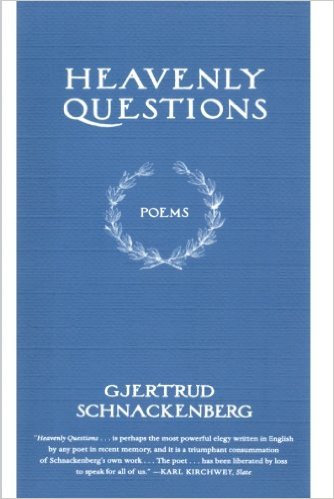
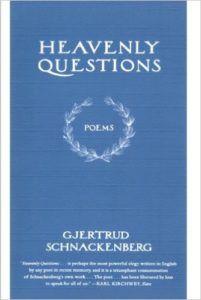 by Gjertrud Schnackenberg, Winner of the 2011 Griffin Poetry Prize,
by Gjertrud Schnackenberg, Winner of the 2011 Griffin Poetry Prize,
Farrar, Straus, and Giroux Paperbacks, 2011,
80 pages, paper, $13,
ISBN: 9780374533045
Buy the Book
Heavenly Questions: Poems Present Yet Outside the Grief
If fortune bygan to dwelle stable, she cesed[e] an to ben fortune.
If Fortune’s wheel spins too many times, it ceases to have Fortune’s power.
— Chaucer’s Boethius
Poetry has a long history of being able to console its readers. After my stay in the hospital last summer, with plenty of illness and grief to go around, I revisited the question of whether a private illness or grief can be shared in a public way through poetry.
Usually, the more regular the verse or meter, the less I feel part of that public grieving. However, with the first poem in Gjertrud Schnackenberg’s beautifully constructed philosophical poems, the regular meter becomes a lullaby that intends to console the patient. As with many lullabies, a story is shared; in this case the subject is Archimedes, philosopher and inventor of ancient machines. She sings:
A visit to the shores of lullabies,
Where Archimedes, counting grains of sand,
Is seated in his half – filled universe. . . .
The rocking, lulling iambic lines mime the first of many heavenly questions that this volume will pose. The cycles of the sand, water, earth, and waves frame a scene that we somehow know is a sickbed or a hospital room:
And all is well now, hush now, close your eyes,
And one . .. . by one . . . by one . . .. by one . . . by one. . . .
The flakes of mica gold and granite – crumbs
Materialize and dematerialize.
Here Schnackenberg uses Archimedes’ work as an extended metaphor for medical technology and its limits, and the effect is like that of a medieval manuscript found in the middle of a modern hospital. The poem partially removes us from the scene of the dying in the clinical way, but it doesn’t yet console any more than the “pastoral services” that modern hospitals still may offer. The patient is only illuminated in an imagined corner of the text.
Eager to find more of Schnackenberg’s work, I did not have to look far to find a beautiful short poem called “Night Fishing,” which opens her selected poems in the volume Supernatural Love. This poem metaphorically embodies the first signs of illness in a muted voice, less heightened than the hospital poems but just as distinct:
Just as a fish lurks deep in water weeds,
A thought of death will lurk deep down, will show
One eye, then quietly disappear in you.
Not since Amy Clampitt’s “A Silence Opens” do I feel so much humanity and tact in poems that hover around the idea of death, materializing and dematerializing it without violating the patient’s privacy and sense of self.
Why do Schnackenberg’s poems console me ? A lot of poems that used to console me do not. I’ve read over Milton’s “Lycidas” and Tennyson’s “In Memoriam” — poems that once consoled but no longer have that effect. The poems that console me these days seem to operate by how effectively they remove us from the scene of grief. Paradoxically, the poet or the speaker, however removed, remains present. Such a poem is Szymborzka’s “A Cat in An Empty Apartment”:
Die ? One does not do that to a cat.
Because what’s a cat to do
in an empty apartment ?
Climb the walls.
Caress against the furniture.
It seems that nothing has changed here,
but yet things are different.
Nothing appears to have been relocated,
yet everything has been shuffled about.
The lamp no longer burns in the evenings. . . .
What more is to be done ?
Sleep and wait.
Let him return,
at least make a token appearance.
Then he’ll learn
that one shouldn’t treat a cat like this.
He will be approached.
as though unwillingly,
slowly,
on very offended paws.
With no spontaneous leaps or squeals at first.
This poem lets me grieve for Szymborska, who died recently at age 88. I can enter her Warsaw apartment through the cat in this poem. The observer, who is located close to, yet outside of, the human scene, personalizes the grief.
“Sublimaze,” the second poem in Heavenly Questions, picks up the bedside vigil in a hospital. Unlike the first poem in Heavenly Questions, which is furnished only with the ancient machinery of Archimedes, the new machines of high – tech medicine are part of the scene:
The door I crazed with knocking reappeared.
A transitory door, lit on the wall,
drenched radiant orange, ablaze beyond the bed. .. . .
In the presence of such machinery, the nurse has “materialized and dematerialized” as the metaphors trace the progress of the disease. This is no mere hospital visit, though. These poems bear witness to an illness and a death in much the same way as Auden’s and Stevens’ great hospital poems visit Yeats and Santayana.
Schnackenberg succeeds in locating herself outside the grief in her final poem in the collection, “Bedtime Mahabharata.” This poem effectively closes off her Heavenly Questions collection not without the possibility of heaven or spirituality, but outside of it. The poem is a retelling of a dog – eared paperback that the poet and the patient have shared in their lives. This final retelling gets outside both the grief and the medieval manuscript that Schnackenberg has lovingly created in the previous poems.
In her retelling, the poet of the Mahabharata speculates on the moment when the writer breaks his pen, and the beautiful exit from story within story. We finally share in Schnackenberg’s grief as the patient squeezes her hand.
In northern India —
He squeezed my hand:
What sentence was he writing when it broke ?
A smile, in such a night, with weeks to live.
Pajamas fever – soaked, trying to stave
Annihilation off another night.
The gentleness that nothing could repay.
I pressed his hand’s blue veins against my lips.
A bedtime story, all that we had left,
And mirror – image towers moving off. . . .
Clearly this retelling suggests no ordinary bedtime story, but rather a final meeting. The poet and the patient become integral to the tale being told.
For all of the above reasons, Heavenly Questions is a book I would freely give to console a patient or a poet. These poems understand that what makes us feel grief is the uncertainty, as how she here suggests but does not describe final moments:
In wars we can’t say where, we can’t say when,
Their stories broken off, the fragments fused
Mid – genealogy, mid – epitaph,
Annihilation gusting nearer, here —
Here the god of writers broke his pen.
— M. A. Schorr
Little Boy Blue: A Memoir in Verse
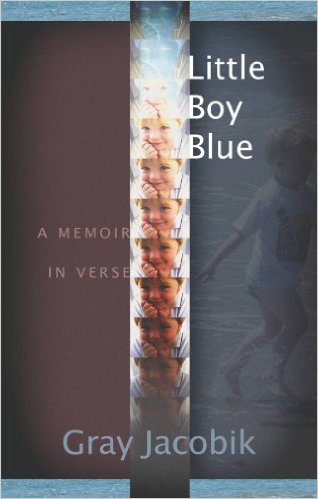
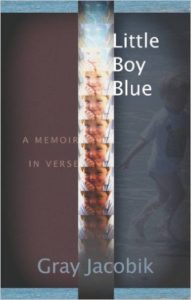 by Gray Jacobik,
by Gray Jacobik,
Laurel Books, CavanKerry Press,
63 pages, paper, $16,
ISBN: 978 – 933880 – 22 – 8
Buy the Book
The art of being a parent is often portrayed like a Norman Rockwell painting, an idyllic frieze with a parent looking fondly at a freckle – faced child who smiles dotingly back. It is a well – polished image of what we want parenting to be. When we ask the question, “How are the kids ?” we like hearing how they graduated, have a new job, a good one, and have met someone — a fairy tale with the prince and princess getting married and starting the lovely cycle of life all over again. But that isn’t how it always is.
In Gray Jacobik’s new book, she turns the parenting fairy tale on its head. She reveals not only how she as a parent often failed — failed for reasons any of us would fail — but how her bi – polar son would never live a normal life, would inexorably change her own life, and would lead her to do things she’d never imagined she’d do.
Not often do I find a book of poems that I read from start to finish, but this book moves so furiously forward, taking us from her teenage romance to a pregnancy that her family sought to cover up, from her desperate struggle to parent a child who seemed charged on an Eveready battery to the agonizing slide of her son into mental illness, that I could not put it down. What is so refreshing is how unsparingly she speaks of her own feelings: her not wanting him, her needing him, her being exhausted by him, charmed by him, frightened by him. Her wanting her own life, her seeking men to replace those he wore out. Her wanting to escape. As a parent, I have felt the same way. The wanting out is not a pretty thought, but it’s there like a loaded gun.
For all the agony, however, this book is filled with tender moments of wonder as she discovers who he is:
Hyperactive was the diagnosis.
What, in the ancient world,
would they have said of you ?
Or in Charlotte Bronte’s Spawn
of Dionysus ? Imp ? Hellion ?
And yet such a sweetness
in you too, a tender – heartedness
& sympathy . . . hypersensitive, living
in a culture that had to brutalize
you.
She watches him as he talked to birds, dogs, cats, any small animal and, eventually, with his own radio show, to the air. She recounts the little episodes that made — and make — his life endurable: the over – the – edge jokester as a child and, as an adult, his radio show “The Atheists Hour,” mocking the religious right. She carries us through several marriages — men as lost as her — and how, even after long drives to bring her son home, she takes solace in the little boy who pesters her:
Hey, mom, make a wish. .. . .
In the boy who tells her:
Mom, you’re most like a zebra — calm & flashy.
Who asks again:
. . . Mom, be serious. Make a wish.
And she responds,
I wish I’d never hit you or screamed at you.
Any of us who are parents nod our heads and say, “Yes, yes, we are with you.”
This is a book that will take your heart, but you will feel safe in the hands of a woman who speaks clearly and honestly about what is behind the pretty pictures: our lives.
— Bruce Spang
Fabric
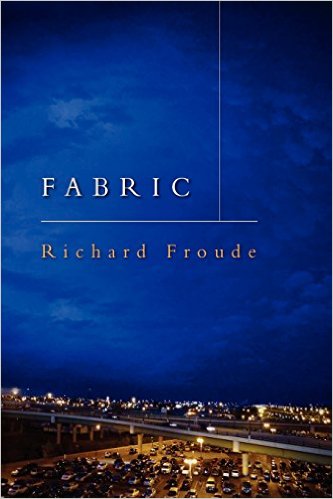
 by Richard Froude,
by Richard Froude,
Horse Less Press, 2011,
120 pages, paper, $15.00,
ISBN: 978-0-982989-60-9
Buy the Book
“Yesterday, aged 29, I bought a dustbuster.” Such declarative sentences fill Richard Froude’s Fabric. The “I” of the book is a likable fellow who buys dustbusters, likes a good wheeze (albeit while staying up all night rewriting the dictionary), and likes to eat cold grilled chicken from Ziploc ® bags. He possesses a willingness to participate that beguiles the theoretical complexities that vie for supremacy in this hybrid of poetry /fiction /memoir.
At first glance, the book is arranged in prose chunks, possibly termed poems, that each take up roughly a half page. A reader may smell poetry leaking through the pages, but Froude shies away from such a moniker: “The word ‘poet’ makes me uncomfortable.” And one sympathizes with him, as Poets come to mind, dressed in all black with well – placed berets atop boozy breath.
In fact, Froude shies away from most gestures of qualification, but he does so in a paradoxical way. His quick, direct sentences give a reader the sense that he is telling straight facts, but this definitiveness quickly undefines itself as a reader realizes that what Froude is saying is anything but explanatory. Froude mentions that “fiction is revealed to be the most popular form of immortality.” So perhaps there is an element of ambition, of immortality here (can it ever be very far absent from any writer ? ), but Froude immediately follows this statement with: “I don’t think I’m going to explain this any further.” It is this theoretical push, and then quick retreat, that characterizes much of the book, and one almost begins to feel that Froude is too modest to fully explain himself, or even to fully acknowledge the ambition of the book. He is even more likable as an author because of this modesty, which feels genuine as opposed to a false – bred modesty.
The book is really a book of transitions. How a reader is able to experience and follow these transitions determines the level of enjoyment extracted from the book. They are quick turns, fast theoretical yanks of the wheel to accommodate such drivers as Deleuze, Jabes, and Barthes, and to be honest, I didn’t follow all of them. But that’s not so surprising; I rarely ever manage to do this. As a reader, I sometimes feel my driving /reading skills are more attuned with my inner grandmother, who perpetually drives ten miles below the speed limit. But this did not inhibit my reading pleasure of Fabric. And in fact, Froude at one point says: “I do not understand the transition. I hold you until you disappear.” It’s a pleasurable, if fleeting, embrace.
Some of these transitions are more successful than others. From page 33 to 34, Froude elegantly moves from a beautiful poetic sequence about constellations, blood and cities into an anecdote, on page 34, about a family trip to Orlando and on to the invention of the stadium wave (I told you the transitions were fast). However, on page 35, two prose sections are linked by the clunky transitional phrase, “That is,” signifying to this reader that this particular turn felt a little forced. In a book with so many fast turns, a few slack ones only feel inevitable.
In order to really appreciate the denseness of Fabric, a reader must have a certain postmodern / New Prose appetite for theoretical acrobatics that can, at times, feel like they exist for their own sake. I enjoyed Froude’s anecdotes over his aphorisms, small narratives about Jackie Robinson’s rookie card or the detonation of the 29 – kiloton nuclear device named “Apple II.” It is a heady mix of trivia and history mixed with a high – pedigree of abstract poetics.
Towards the end of a piece about Richard Brautigan’s A Confederate General from Big Sur, Froude mentions Erik Satie: “reading (as well as writing) can exist as a practice of measurement.” This feels appropriate for Fabric as well. There is an exactness to Froude’s exploration, a writer’s scientific reveling in history’s ephemera. One constructs an image of the author joyfully sifting through the spilled contents of an enormous Ziploc ® bag that had contained not cold grilled chicken, but fact after theory after fact, and all of it awaiting the dustbuster of his pen.
— Jefferson Navicky
Happy Life
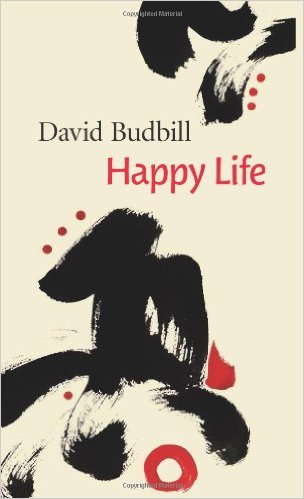
 by David Budbill,
by David Budbill,
Copper Canyon Press, 2011,
119 pages, $16.00,
ISBN: 978-1-55659-374-1
Buy the Book
It seems that the title of David Budbill’s latest volume of poetry tells the truth. It is not a sardonic commentary on life in the twentieth century. It is rather a collection of warm and accessible poems that grow out of the poet’s experience and his meditations on who he is and how he found himself over the last forty years. What keeps these poems from being just another man’s reflection on aging and vanished hopes is Budbill’s clear language, his wry, self – effacing humor and his humble recognition of all the poets to whom he owes his poetry. Oh, and it also includes verse dedicated to chainsaws, sex and ambition, and an over – riding arc of stillness in the face of natural beauty.
So what happens if you take a working class boy from Cleveland with a love of jazz and a penchant for Zen poetry to the woods ? Something like the poem “A Day Off,” which, after an opening of spring planting and endless work, work, work, opens its second stanza:
until, that is, I hurt my foot and now
I’m so lame I can barely stand,
which means, I have to spend the day in bed
with tea, the history of
Sung Dynasty poetry and the life of Yang Wan-li—
Showing once again how
misfortune
sometimes brings the opposite.
This is not to portray Budbill as out of the loop of current events. One of my favorite pieces in the book is the terse poem “Cynical Capitalists”:
Privatize profit.
Socialize loss. (40)
After listening to endless social commentary on the radio, it is comforting to read such a pungent distillation.
While to some these poems may seem uncomplicated, even simple, they have the feel of a thing made, filed sharp until the rough edges run smooth, then oiled until the words slide across the page. Too often I think contemporary poems run to the jagged and fractured, the overly complicated and dense. Sometimes the simple thing is all we need, and belief is all the poem asks of us. This is a lesson Budbill has learned in his forty years in the woods. It is not the only lesson, but it is an important one.
At times among these poems, we get to go to the city, as in “Three Days in New York: A Blues in B flat.” The poet wanders the city eating freight cuisine, pondering wonders of the non – European world at the Metropolitan Museum and musing: “Who told us Europe discovered the world ? ” But it is the final stanza of this longer poem that pictures the poet as he is:
And here I am this old white guy all decked out in my
yellow, orange, red, black, blue, and white dashiki
and my blue and gold African mirror hat playing
Japanese bamboo flute and ropes of bells from India
And a gong from Tibet, with these far – out, crazy
jazz musicians what come in how many different
shades of flesh and nationality, and me right here
on the Lower East Side in New York City reading my cracker,
woodchuck, honky, ofay, green mountains,
ersatz Chinese wilderness poetry.
Whatever David Budbill is, he is in the middle of it. Whether as an observer diving into his dreams, as a jazz musician, a poet, a playwright, a wood – cutting monk, or a scotch – drinking old man with his cheeks to the wood stove, he is all in. If we all went that far, wouldn’t it be a happy life ?
As he says in the sixth stanza of “Three Days in New York”:
Polyglot Gumbo Masala Stew
Hybrids Bastards Mutts All of us
All sloshed together Ain’t it grand ?
I, for one, need to be reminded of that.
— Michael Macklin
N.B. A Happy Life is the third in a series of books which also includes: Moment to Moment: Poems of a Mountain Recluse (1999) and While We’ve Still Got Feet (2005) published by Copper Canyon Press. Each of these is part of the chronicle of Budbill’s journey which involves spending nearly forty years on the side of a mountain in northern Vermont.


